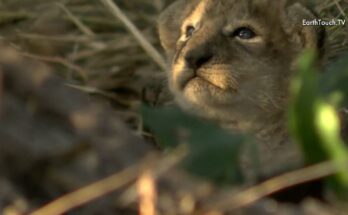
In the wild plains of Africa, one of the most heartwarming sounds is not the mighty roar of a lion, but rather the tiny chirps of a baby lion cub calling out to its mother. Unlike the deep, thunderous growl associated with adult lions, the cub’s vocalizations are soft, high-pitched, and surprisingly bird-like. These chirping sounds are not only adorable but serve an important purpose—communication and bonding.
Lion cubs are born blind and helpless, relying entirely on their mother for protection, warmth, and food. As they grow, their first steps into the world are cautious and curious. During this stage, a cub will often chirp when it feels separated or unsure. These chirps are distress calls, meant to catch the attention of the mother and guide her back to the cub’s location. The sound is short, repetitive, and sharp, cutting through the ambient noise of the savanna.
The mother lioness, ever attentive, responds quickly to these calls. Her instincts are finely tuned, and she can recognize the specific calls of her own cubs even among the noise of the pride or other animals. This communication is crucial, especially in the early months when cubs are at their most vulnerable to predators.
This chirping phase also reflects a tender and emotional connection between the cub and its mother. It’s a reminder that even future kings of the jungle start life with a need for care, love, and constant reassurance. Observing a baby lion chirp for its mother offers a touching glimpse into the early life of one of nature’s most iconic animals—a moment of softness in the often harsh world of the wild.


